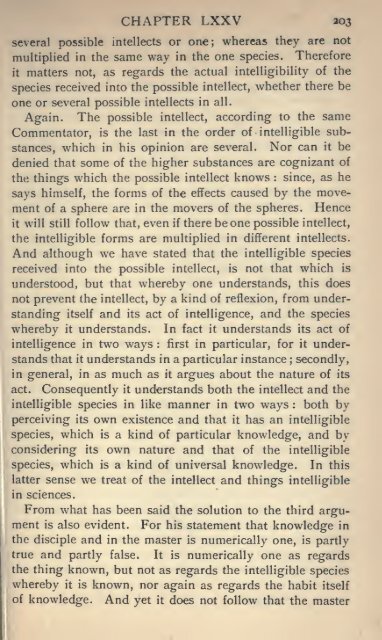summa-contra-gentiles
Summa
Summa
You also want an ePaper? Increase the reach of your titles
YUMPU automatically turns print PDFs into web optimized ePapers that Google loves.
CHAPTER LXXV 203<br />
several possible intellects or one; whereas they are not<br />
multiplied in the same way in the one species. Therefore<br />
it matters not, as regards the actual intelligibility of the<br />
species received into the possible intellect, whether there be<br />
one or several possible intellects in all.<br />
Again. The possible intellect, according to the same<br />
Commentator, is the last in the order of intelligible substances,<br />
which in his opinion are several. Nor can it be<br />
denied that some of the higher substances are cognizant of<br />
the things which the possible intellect knows :<br />
since, as he<br />
says himself, the forms of the effects caused by the movement<br />
of a sphere are in the movers of the spheres. Hence<br />
it will still<br />
follow that, even if there be one possible intellect,<br />
the intelligible forms are multiplied in different intellects.<br />
And although we have stated that the intelligible species<br />
received into the possible intellect, is not that which is<br />
understood, but that whereby one understands, this does<br />
not prevent the intellect, by a kind of reflexion, from understanding<br />
itself and its act of intelligence, and the species<br />
it<br />
whereby understands. In fact it understands its act of<br />
intelligence in two ways first in : particular, for it understands<br />
that it understands in a particular instance ; secondly,<br />
in general, in as much as it<br />
argues about the nature of its<br />
act. it<br />
Consequently understands both the intellect and the<br />
intelligible species in like manner in two ways both by<br />
:<br />
perceiving its own existence and that it has an intelligible<br />
species, which is a kind of particular knowledge, and bv<br />
considering its own nature and that of the intelligible<br />
species, which is a kind of universal knowledge. In this<br />
latter sense we treat of the intellect and things intelligible<br />
in sciences.<br />
From what has been said the solution to the third argument<br />
is also evident. For his statement that knowledge in<br />
the disciple and in the master is numerically one, is partly<br />
true and partly false. It is<br />
numerically one as regards<br />
the thing known, but not as regards the intelligible species<br />
whereby it is known, nor again as regards the habit itself<br />
of knowledge. And yet<br />
it does not follow that the master


















